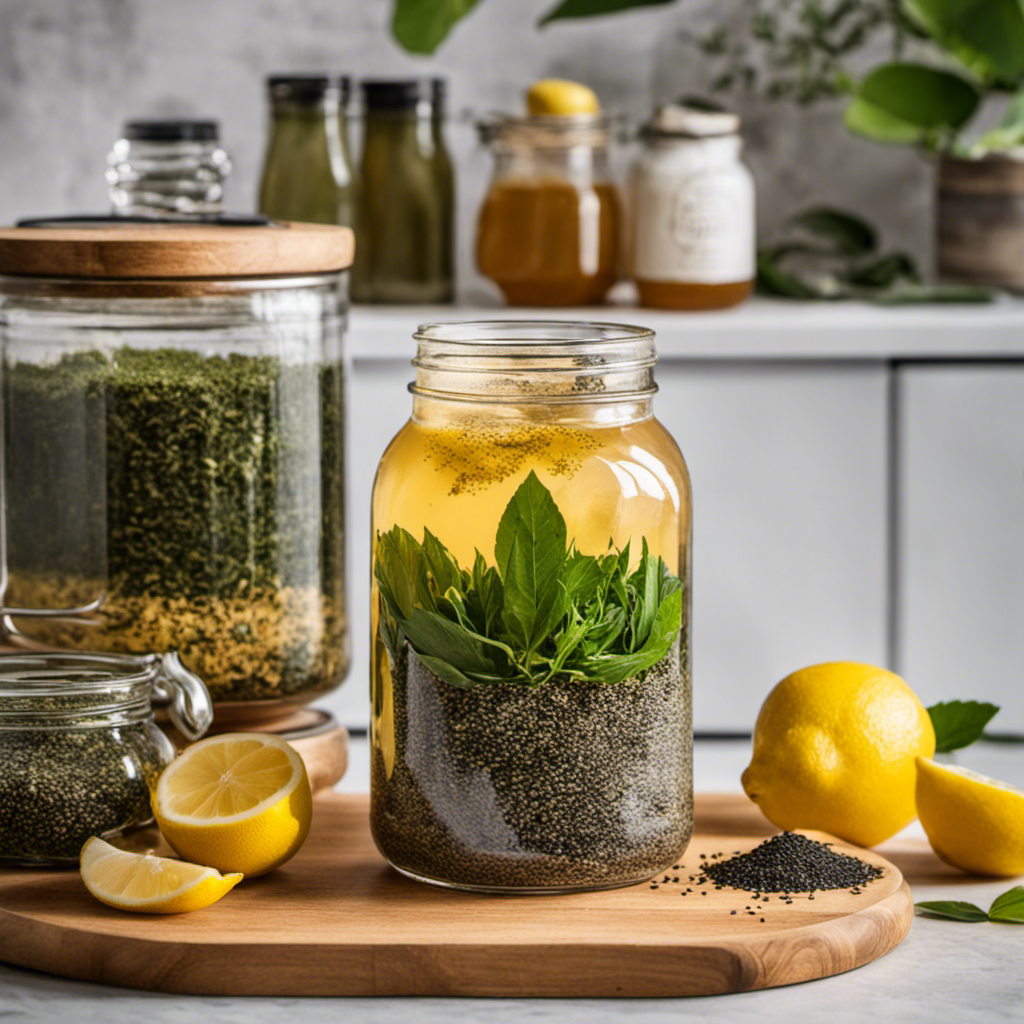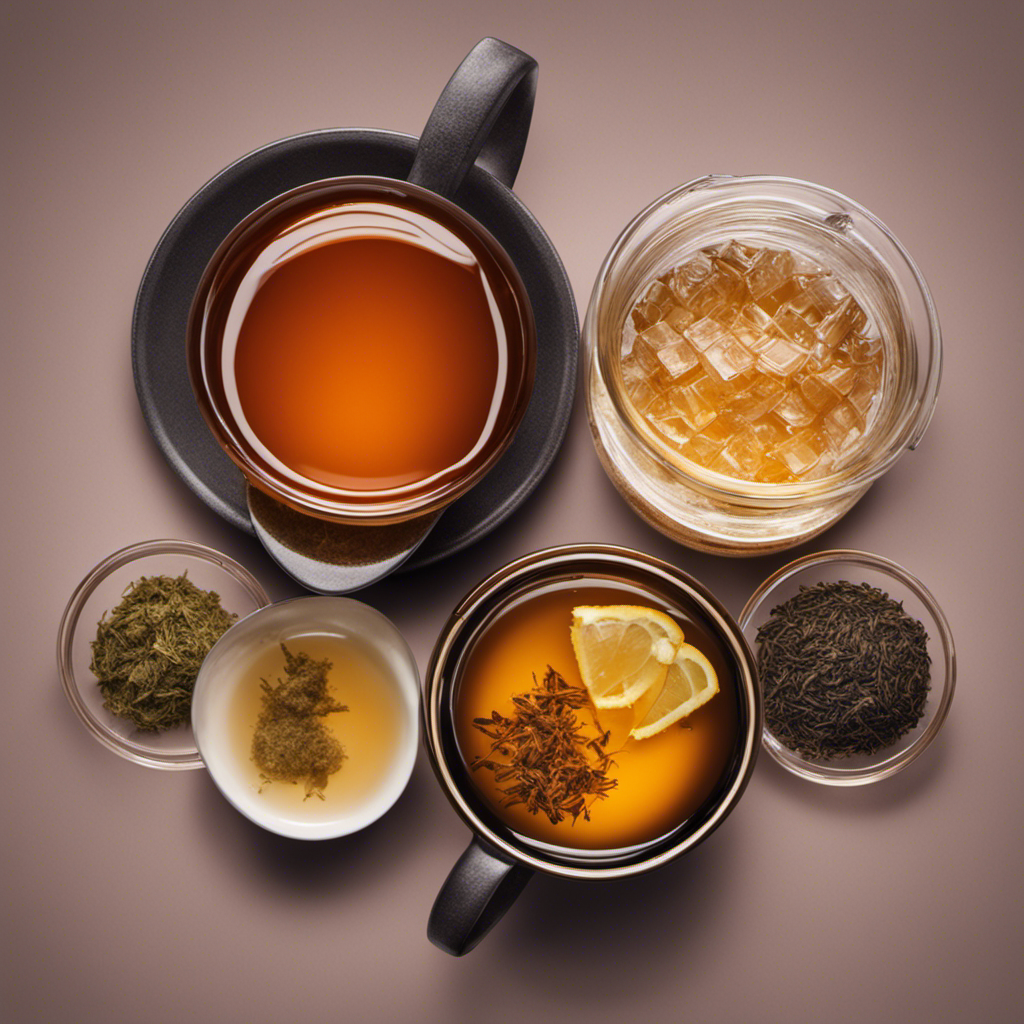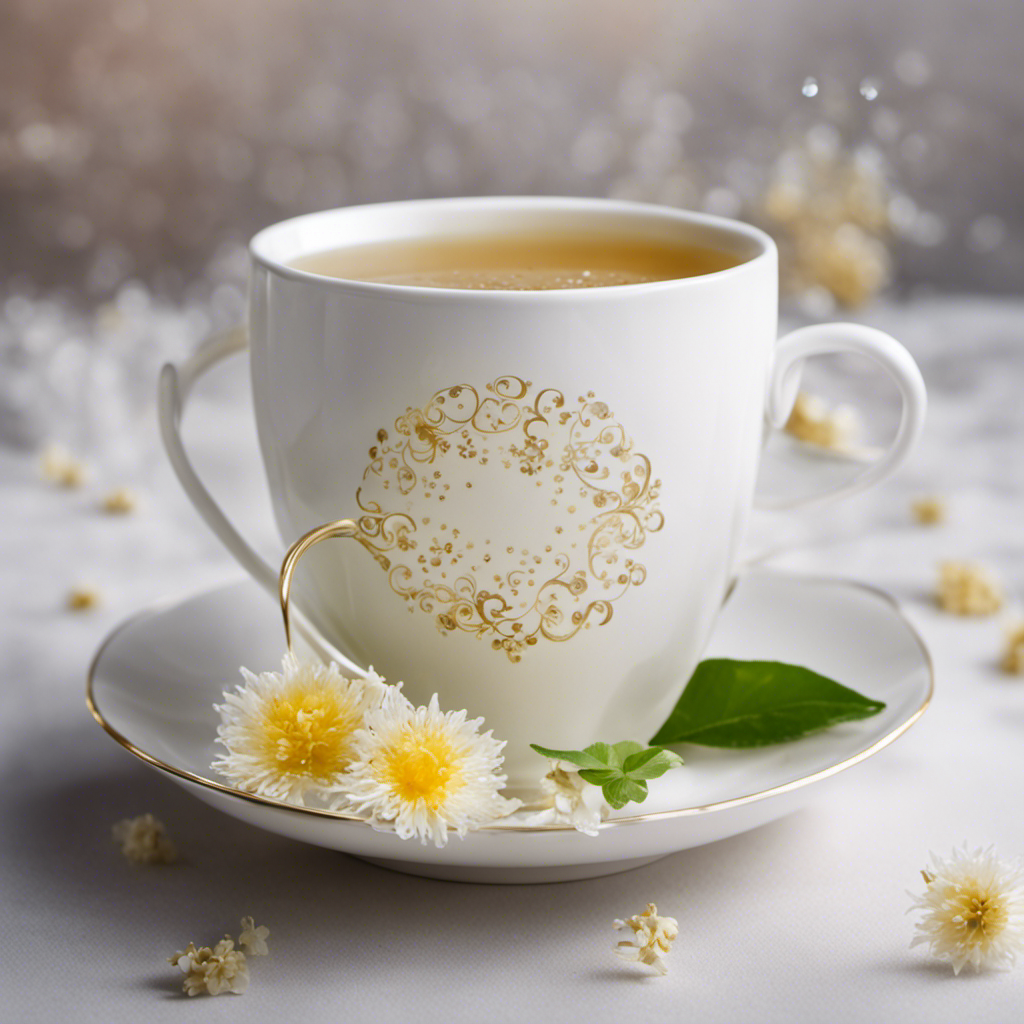Kombucha Tea
How to Brew Kombucha Without Starter Tea
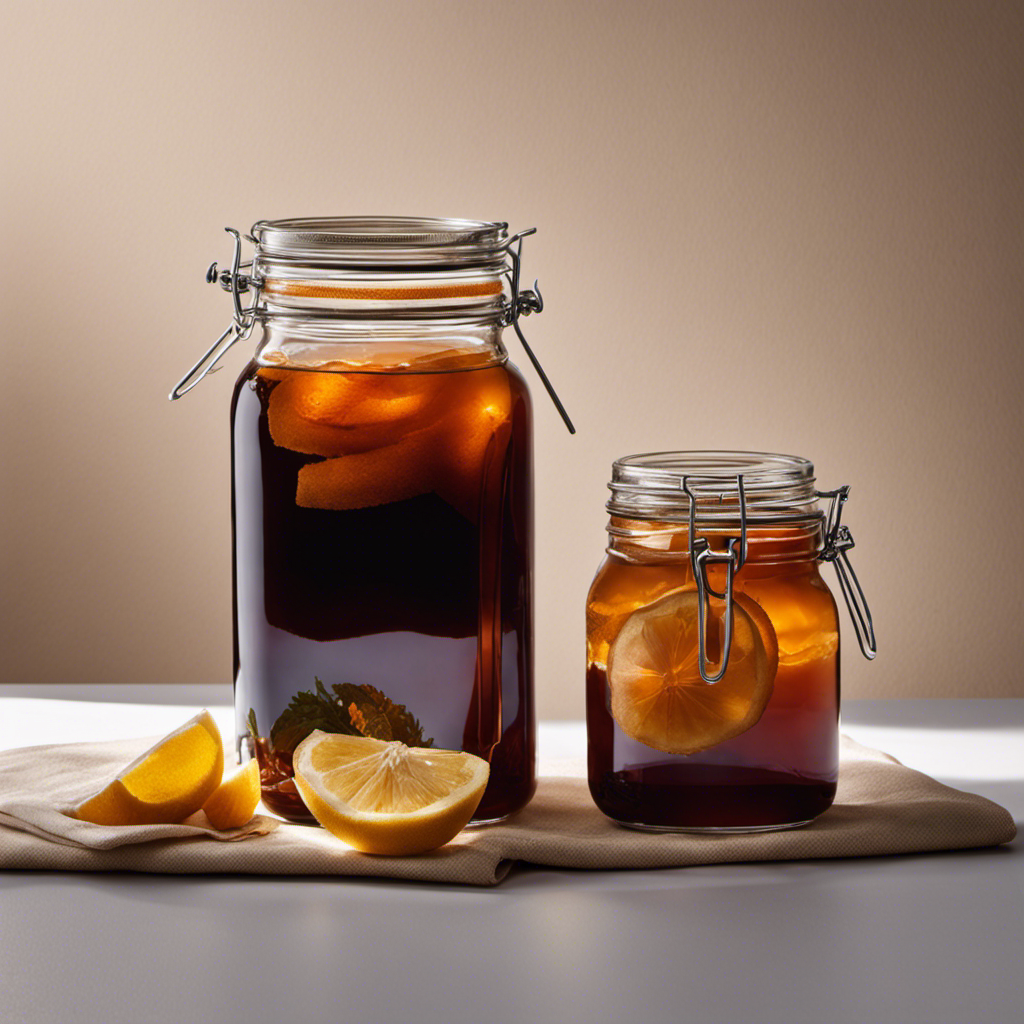
I’ve always been intrigued by the art of making kombucha, however, one aspect that frequently challenges me is locating the starter tea. This essential component initiates the fermentation process.
However, after some research, I discovered that there are alternatives. In fact, you can brew kombucha without starter tea altogether.
In this article, I will guide you through the step-by-step process, providing you with all the information you need to brew your own batch of delicious and probiotic-rich kombucha, even without starter tea.
Key Takeaways
- Apple cider vinegar and unflavored, unpasteurized store-bought kombucha can serve as substitutes for starter tea.
- Experimenting with different types of tea, such as herbal, green, black, and white tea, can create unique flavor profiles.
- Different types of sugar, including white sugar, brown sugar, honey, or fruit juice, can be used for fermentation, contributing to the final taste and sweetness of kombucha.
- Following a step-by-step guide and troubleshooting common issues like mold growth or unusual flavors is crucial for successful kombucha brewing without starter tea.
The Basics of Kombucha Brewing
To start brewing kombucha without starter tea, you’ll need to understand the basics of kombucha brewing.
Kombucha is a fermented tea that has been consumed for centuries due to its numerous health benefits. Regular consumption of kombucha can improve digestion, boost the immune system, and increase energy levels. It is rich in probiotics, enzymes, and antioxidants, making it a great addition to a healthy lifestyle.
When brewing kombucha, it is important to troubleshoot common issues that may arise. These can include mold growth, weak or vinegary taste, or excessive carbonation. By understanding the fermentation process, maintaining proper temperature and hygiene, and using quality ingredients, you can ensure a successful batch of homemade kombucha.
With a little patience and practice, you’ll be enjoying your own delicious and nutritious kombucha in no time.
Finding Alternatives to Starter Tea
You can try using a different liquid as a substitute for starter tea when making your batch of homemade kombucha. While starter tea is usually made from previously fermented kombucha, there are alternative fermentation methods you can explore.
One option is using apple cider vinegar as a substitute for starter tea. It contains acetic acid, which can help kick-start the fermentation process. Another alternative is using store-bought kombucha as a starter liquid. Just make sure it is unflavored and unpasteurized for the best results.
If you encounter any issues during the fermentation process, such as mold or a stalling fermentation, it’s important to troubleshoot common issues. This can include maintaining proper temperature and cleanliness, using the right ratio of ingredients, and ensuring adequate oxygen supply.
Now that you know how to find alternatives to starter tea and troubleshoot common issues, let’s move on to selecting the right tea for kombucha.
Selecting the Right Tea for Kombucha
Using the right type of tea is crucial when making homemade kombucha. The type of tea you choose will greatly impact the flavor and fermentation process of your kombucha. Here are four key factors to consider when selecting tea for your kombucha:
-
Choosing herbal teas for kombucha: Herbal teas, such as chamomile, hibiscus, or mint, can add unique flavors to your kombucha. They are caffeine-free and have various health benefits.
-
Experimenting with different tea blends for kombucha fermentation: Don’t be afraid to mix different types of teas to create your own unique blend. Green tea, black tea, and white tea are popular options. Each tea will bring its own distinct flavor profile to your kombucha.
-
Consider the caffeine content: Tea contains caffeine, which is essential for the fermentation process. However, if you prefer a caffeine-free kombucha, opt for herbal teas or decaffeinated tea.
-
Quality matters: Choose high-quality, organic teas to ensure the best flavor and health benefits for your kombucha. Avoid teas with added flavorings or artificial additives.
Exploring the Role of Sugar in the Fermentation Process
One important factor to consider when fermenting homemade kombucha is the role of sugar in the process. Sugar serves as the primary food source for the kombucha culture, also known as the SCOBY (symbiotic culture of bacteria and yeast).
During fermentation, the SCOBY consumes the sugar and converts it into various compounds, including organic acids, carbon dioxide, and alcohol. This transformation gives kombucha its unique flavor profile.
The type of sugar used can impact the final taste of the drink. Different types of sugar, such as white sugar, brown sugar, honey, or even fruit juice, can be used for fermentation. Each type of sugar will contribute its own distinct flavor and sweetness to the finished kombucha.
Experimenting with different sugars can help you discover the perfect balance and flavor for your homemade kombucha.
Step-by-Step Guide to Brewing Kombucha Without Starter Tea
To start brewing your own kombucha without starter tea, begin by preparing a sweetened tea mixture. Here’s a step-by-step guide to help you get started:
-
Gather your ingredients: You’ll need black or green tea, sugar, filtered water, and a SCOBY (symbiotic culture of bacteria and yeast). If you don’t have a SCOBY, don’t worry, we’ll cover alternative methods.
-
Brew the tea: Steep the tea leaves in hot water for about 10 minutes. Remove the tea bags and add sugar to the hot tea, stirring until dissolved.
-
Cool the tea: Let the sweetened tea mixture cool to room temperature. This is important because high temperatures can harm the SCOBY.
-
Add the SCOBY: Gently place the SCOBY into a clean glass jar, then pour the cooled tea mixture over it. Cover the jar with a breathable cloth and secure it with a rubber band.
Remember, if you encounter any issues during the brewing process, such as mold growth or unusual flavors, refer to troubleshooting tips to ensure a successful batch.
Happy brewing!
Frequently Asked Questions
Can I Use Any Type of Tea to Brew Kombucha Without Starter Tea?
Yes, you can use different types of tea to brew kombucha without starter tea. However, it is important to choose a tea that is high in tannins to ensure proper fermentation. Additionally, you can use alternatives to sugar, such as honey or fruit juice, in the fermentation process.
How Long Does It Take for Kombucha to Ferment Without Starter Tea?
Making kombucha without starter tea can speed up fermentation, but it is not possible without fermentation. The process usually takes 7-14 days, but adding a SCOBY or extra sugar can expedite it.
Can I Use Honey or Other Sweeteners Instead of Sugar in the Fermentation Process?
Using honey as a sweetener in kombucha fermentation has pros and cons. Honey adds a unique flavor and potential health benefits, but it may affect the fermentation process. It’s best to experiment and find what works for you.
Is It Necessary to Use a Glass Jar for Brewing Kombucha Without Starter Tea?
Using alternatives to glass jars for brewing kombucha without starter tea can be done, but it’s important to consider the benefits of using starter tea in the brewing process.
Can I Use Tap Water Instead of Filtered or Distilled Water When Brewing Kombucha Without Starter Tea?
Using tap water for brewing kombucha without starter tea is possible, but using filtered or distilled water is recommended. Filtered or distilled water removes impurities, ensuring a healthier fermentation process and better taste.
Conclusion
In conclusion, brewing kombucha without starter tea is like embarking on a new adventure without a map. It may seem daunting at first, but with the right knowledge and resources, you can successfully navigate this uncharted territory.
Remember to select the right tea and sugar to ensure a flavorful and balanced fermentation process. Follow the step-by-step guide we’ve provided, and soon you’ll be sipping on your very own homemade kombucha, proud of the journey you’ve taken to get there.
Cheers to your brewing success!
Justin is a seasoned author, coffee and tea enthusiast, and an essential member of the Cappuccino Oracle team. With a keen appreciation for the complexities of coffee, coffee alternatives, and tea, Justin has dedicated his professional career to exploring these realms and sharing his insights with readers worldwide.
Justin’s immersion in the world of coffee, coffee alternatives, and tea began at a young age, kindling a passion that extended beyond mere consumption. This love for these beverages led him to combine his talent for writing with his devotion to coffee and tea, bringing him to Cappuccino Oracle as a dedicated author.
Kombucha Tea
Miraculous Kombucha Unleashes a Fountain of Health
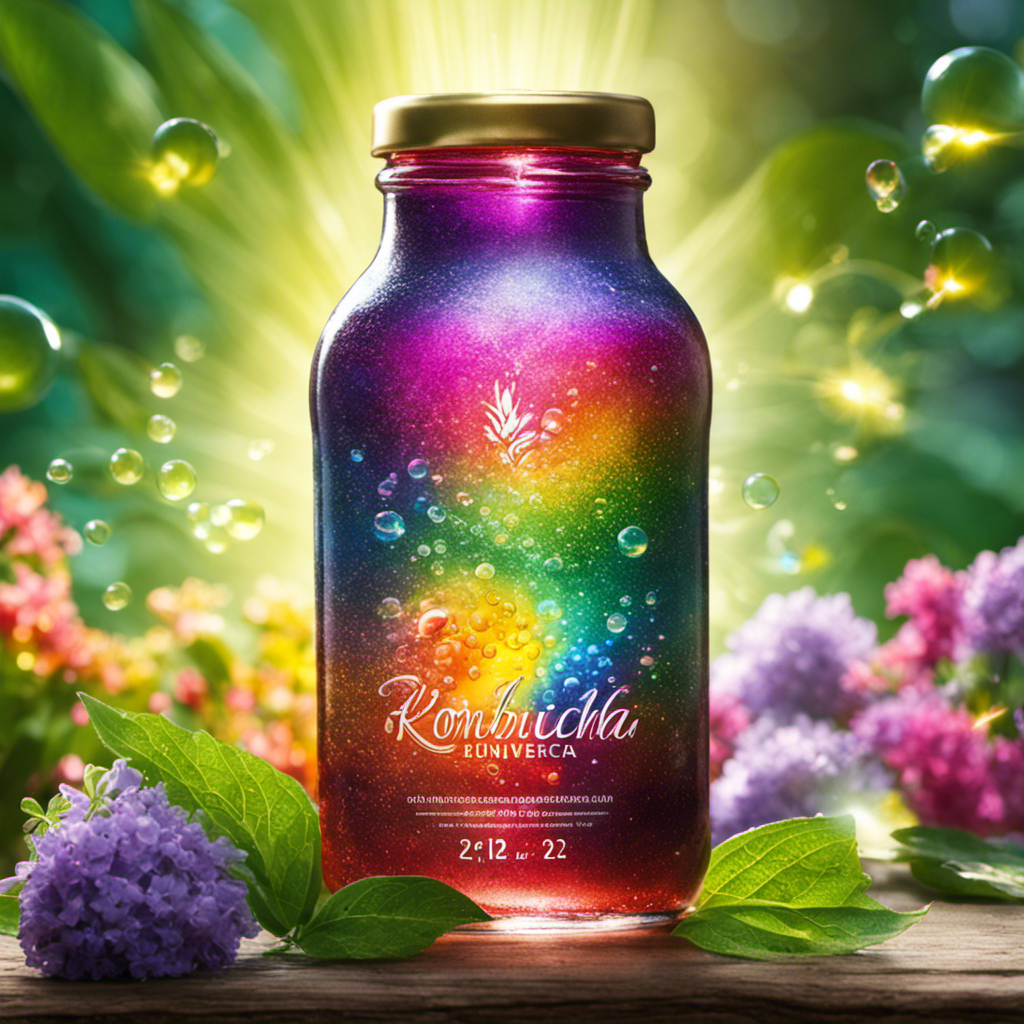
As someone who is passionate about health and enjoys doing research, I have always been fascinated by the effectiveness of natural remedies.
And let me tell you, kombucha is truly miraculous. This fermented tea has gained popularity for its health benefits, from reducing joint pain to improving digestion.
But that’s not all – kombucha also detoxifies our bodies, boosts immunity, and provides a natural source of energy.
Join me on this journey as we uncover the wonders of kombucha and unlock the secrets to a healthier, more vibrant life.
Key Takeaways
- Kombucha has anti-inflammatory properties that can help with arthritis and gout.
- Kombucha contains probiotics that improve gut health and aid in digestion.
- Consuming kombucha in moderation can aid in weight management and promote regularity.
- Kombucha’s antioxidants protect against free radical damage and contribute to healthy skin and hair.
The Origins of Kombucha’s Healing Powers
While the exact origins of kombucha’s healing powers are still debated, it’s widely believed that its beneficial properties stem from the fermentation process. Fermentation involves the action of bacteria and yeast on the sweetened tea mixture, resulting in the formation of organic acids, vitamins, enzymes, and probiotics. These components contribute to the health benefits associated with kombucha.
Understanding the science behind kombucha’s health benefits is crucial in unraveling the secrets of its healing powers. Research suggests that kombucha’s probiotics improve gut health, its antioxidants protect against free radical damage, and its anti-inflammatory properties reduce joint pain and swelling. Additionally, kombucha aids in digestion, boosts immunity, and provides natural energy without the negative effects of caffeine.
While more research is needed, the evidence thus far supports the notion that kombucha offers a fountain of health.
A Boost for Digestive Health
I love how kombucha aids in digestion and promotes regularity, making it a great option for boosting digestive health. Kombucha contains probiotics that improve gut health by supporting the growth of beneficial bacteria in the intestines. These probiotics help break down food, absorb nutrients, and prevent harmful bacteria from thriving. The natural fermentation process of kombucha produces organic acids, enzymes, and vitamins that promote regularity and alleviate digestive issues such as bloating and constipation.
| Improving Gut Health | Promoting Regularity |
|---|---|
| Probiotics in kombucha improve the balance of gut bacteria, enhancing digestion and nutrient absorption. | The organic acids in kombucha stimulate bowel movements and prevent constipation. |
| Kombucha helps reduce inflammation in the gut, relieving symptoms of digestive disorders such as irritable bowel syndrome (IBS). | The enzymes in kombucha aid in breaking down food, facilitating smooth digestion. |
| The antioxidants present in kombucha protect the gut lining from damage caused by free radicals and inflammation. | Kombucha’s probiotics strengthen the intestinal barrier, preventing the entry of harmful pathogens. |
Incorporating kombucha into your daily routine can have a positive impact on your gut health and overall well-being. However, it is important to note that individual responses to kombucha may vary, and moderation is key. If you have any pre-existing health conditions or concerns, it is always advisable to consult with a healthcare professional before making any significant changes to your diet.
Kombucha’s Impact on Skin and Hair
Kombucha improves skin health and helps maintain hair color, as it’s rich in vitamins and minerals essential for healthy skin and hair. The antioxidants found in kombucha protect against free radical damage, which can contribute to aging. Additionally, the probiotics present in kombucha promote a healthy scalp and hair growth.
The acidity of kombucha also acts as a natural hair conditioner, adding shine and softness to the hair. While more research is needed to fully understand the extent of kombucha’s effects on aging, preliminary studies suggest that it may have positive impacts on reducing inflammation and improving skin elasticity.
Overall, incorporating kombucha into your skincare and haircare routine may provide additional benefits in maintaining a youthful appearance and promoting healthy hair growth.
Relieving Arthritis Pain With Kombucha
I’ve found that adding kombucha to my daily routine has helped in relieving arthritis pain by reducing inflammation and providing natural energy. Here are three ways kombucha can promote joint health and reduce inflammation:
-
Anti-inflammatory properties: Kombucha contains compounds that have been shown to reduce inflammation in the body. By reducing inflammation, it can help alleviate joint pain and swelling associated with arthritis.
-
Probiotics for gut health: Kombucha is rich in probiotics, which promote a healthy gut. A healthy gut can contribute to reduced inflammation throughout the body, including in the joints.
-
Detoxification benefits: Kombucha has detoxifying properties that help eliminate harmful toxins from the body. By removing toxins, it can support joint health and reduce inflammation.
While more research is needed to fully understand the extent of kombucha’s benefits for arthritis, incorporating it into your daily routine may help in reducing inflammation and promoting joint health.
Exploring Kombucha’s Potential Benefits for Specific Health Issues
Occasionally, it’s important to explore kombucha’s potential benefits for specific health issues, as it may offer targeted relief and support for certain conditions.
One area of interest is kombucha’s effects on weight management. Some studies suggest that kombucha can aid in weight loss by decreasing body weight and BMI. It’s believed that the probiotics in kombucha contribute to improved gut health, which may have a positive impact on metabolism and digestion.
Another area of exploration is kombucha’s effects on liver health. Preliminary research indicates that kombucha may have positive effects on fatty liver, possibly due to its detoxifying properties. However, more research is needed to fully understand the extent of kombucha’s benefits for liver health.
As with any health-related topic, it’s important to approach kombucha as part of a balanced and varied diet, and to consume it in moderation to avoid potential health risks.
Frequently Asked Questions
Can Kombucha Cure Arthritis or Gout Completely?
No, kombucha cannot cure arthritis or gout completely. However, it may help with joint health due to its anti-inflammatory properties. It’s important to note that further research is needed to fully understand the benefits of kombucha for these conditions.
Is It Safe to Consume Large Quantities of Kombucha?
Yes, it’s safe to consume large quantities of kombucha as long as it’s done in moderation. Kombucha can aid in weight loss by promoting digestion and it also improves immune function.
Does Kombucha Have Any Negative Effects on Digestion or Gut Health?
Kombucha does not have any negative effects on digestion or gut health. In fact, it can improve gut flora due to its probiotic content. However, excessive consumption may contribute to leaky gut syndrome.
Can Kombucha Reverse the Effects of Aging on the Skin and Hair?
Yes, kombucha can help reverse the effects of aging on the skin and hair. Studies show that the antioxidants in kombucha reduce wrinkles and promote hair growth, making it a natural fountain of youth.
Are There Any Potential Side Effects or Risks Associated With Using Kombucha for Yeast Infections or Fatty Liver?
There are potential risks and safety concerns associated with using kombucha for yeast infections and fatty liver. Further research is needed to fully understand its impact and determine the extent of its benefits and potential side effects.
Conclusion
In conclusion, kombucha truly lives up to its reputation as a miraculous fountain of health. Its healing powers, from improving digestion and boosting immunity to relieving arthritis pain and promoting skin and hair health, are truly remarkable.
With its natural detoxifying properties and ability to enhance overall well-being, kombucha is a powerhouse of benefits.
So, why not incorporate this incredible elixir into your daily routine and experience the transformative effects for yourself? It’s a health revolution waiting to happen!
Arf, an author and an innovative enthusiast of coffee, coffee alternatives, and tea, plays a crucial role as a contributor to the esteemed Cappuccino Oracle platform. Renowned for his curiosity and passion for these captivating beverages, Arf has carved out a unique space for himself in the world of exploration and writing. He realized that coffee, coffee alternatives, and tea are not mere drinks to keep one awake, but universes of flavors and stories waiting to be explored.
Arf’s articles for Cappuccino Oracle blend meticulous research with personal experiences, providing readers with an in-depth understanding of various types of coffee, coffee alternatives, and tea, along with their unique characteristics, cultures, and histories. His honest reviews and engaging narratives guide readers on their own journeys, helping them discover their preferences and find their perfect brew.
Kombucha Tea
Kombucha: The Liver Savior You Need
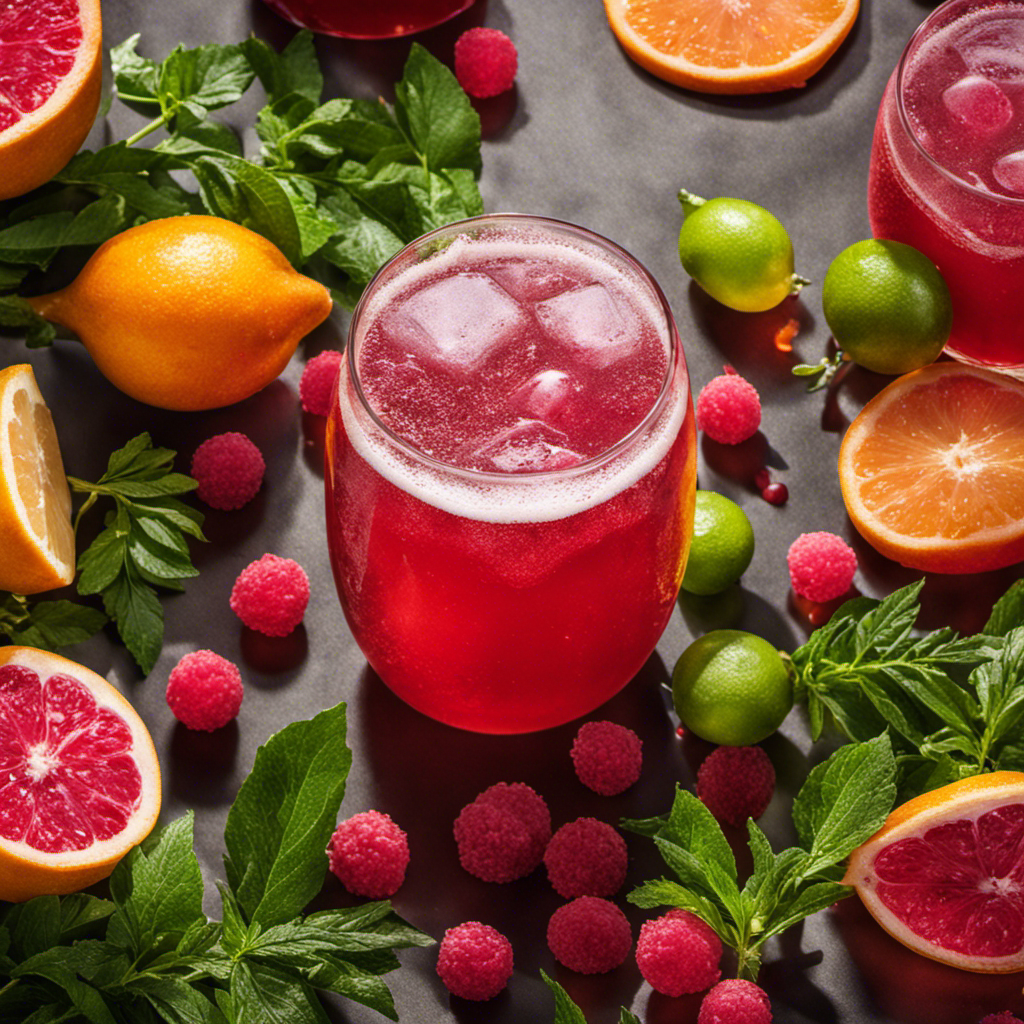
I understand the significance of discovering natural remedies for liver health issues, as I have personally struggled with them. This is why I am thrilled to discuss the advantages of kombucha, a fermented tea that is becoming increasingly popular for its positive effects on liver health.
In this article, we’ll explore kombucha’s impact on fatty liver, gut microbiota in NAFLD, and metabolic alterations. The findings are remarkable – kombucha reduces inflammation and fibrosis, promotes gut microbiota balance, and improves liver metabolism.
Join me as we explore the science behind kombucha’s liver-saving properties.
Key Takeaways
- Kombucha ameliorates liver injury.
- Kombucha reduces lipid accumulation.
- Kombucha increases hepatocyte survival.
- Kombucha decreases inflammation and fibrosis in the liver.
The Impact of Kombucha on Fatty Liver
I have found that consuming kombucha can significantly decrease lipid accumulation in the liver. Research suggests that kombucha plays a vital role in liver disease prevention and has therapeutic potential for liver health.
Studies have shown that kombucha can ameliorate liver injury, reduce lipid accumulation, and increase hepatocyte survival. Furthermore, it decreases inflammation and fibrosis in the liver, which are key factors in liver disease progression.
Kombucha also has a positive impact on gut microbiota in non-alcoholic fatty liver disease (NAFLD), decreasing the abundance of bacteria associated with NAFLD and promoting the growth of beneficial bacteria. Additionally, kombucha’s probiotic properties improve glucose tolerance, reduce hyperinsulinemia, and attenuate liver steatosis.
Overall, incorporating kombucha into a liver-healthy lifestyle may provide numerous benefits, including liver detoxification, protection from oxidative stress and inflammation, and potential prevention and treatment of NAFLD and non-alcoholic steatohepatitis. However, more research is needed to fully understand kombucha’s mechanisms of action.
Kombucha’s Effect on Gut Microbiota in NAFLD
Several studies have demonstrated that kombucha decreases the abundance of bacteria associated with NAFLD, while increasing the growth of beneficial bacteria. This highlights the potential impact of kombucha on gut health and its role in restoring microbial balance.
-
Kombucha’s effect on gut microbiota in NAFLD: Kombucha has been shown to decrease the abundance of bacteria associated with NAFLD, which is beneficial for individuals with this condition. Additionally, it increases the abundance of beneficial bacteria, promoting a healthier gut environment.
-
Kombucha’s role in restoring microbial balance: The ability of kombucha to decrease harmful bacteria while increasing beneficial bacteria suggests its potential in restoring microbial balance in the gut. This is crucial for overall gut health and may have positive implications for individuals with NAFLD.
Considering these findings, incorporating kombucha into a balanced diet and lifestyle may contribute to better gut health and potentially aid in the management of NAFLD. However, more research is needed to fully understand the mechanisms and long-term effects of kombucha on gut microbiota and its impact on NAFLD.
The Effect of Kombucha Probiotic on Metabolic Alterations
Based on the available research, the effect of kombucha probiotic on metabolic alterations shows promising potential in improving glucose tolerance and reducing hyperinsulinemia.
Studies have shown that kombucha can play a significant role in improving insulin sensitivity, which is crucial for managing conditions like diabetes.
Additionally, research has also indicated that kombucha may have a positive effect on liver steatosis, a condition characterized by the accumulation of fat in the liver. Kombucha has been found to attenuate liver steatosis by reducing collagen fiber deposition and enhancing nutrient absorption and liver metabolism.
These findings suggest that incorporating kombucha into a balanced diet and healthy lifestyle may have beneficial effects on metabolic health, particularly in terms of glucose regulation and liver function.
However, further research is needed to fully understand the mechanisms of action and the long-term effects of kombucha on metabolic alterations.
Key Findings on Kombucha’s Effect on Fatty Liver
The key findings on kombucha’s effect on fatty liver show that it ameliorates liver injury, reduces lipid accumulation, increases hepatocyte survival, decreases inflammation in the liver, and decreases fibrosis in the liver.
-
Mechanism of Kombucha’s Action in Fatty Liver:
Research suggests that kombucha’s beneficial effects on fatty liver may be attributed to its ability to improve liver function, reduce oxidative stress, and modulate gut microbiota. The organic acids present in kombucha, such as acetic acid and gluconic acid, have been found to enhance liver detoxification and support overall liver health. -
Potential of Kombucha as a Preventive Measure for NAFLD:
Given its ability to reduce lipid accumulation, inflammation, and fibrosis in the liver, kombucha shows promise as a preventive measure for non-alcoholic fatty liver disease (NAFLD). Incorporating kombucha into a liver-healthy lifestyle, along with proper diet and exercise, may provide numerous benefits and potentially prevent or treat NAFLD.
Further Research and Potential Benefits of Kombucha
I’m excited to explore the potential benefits of kombucha through further research. While there have been promising findings on the impact of kombucha on fatty liver, more understanding is needed on the mechanisms behind its effects.
Clinical trials can provide valuable insights into the specific ways in which kombucha supports liver health. By conducting rigorous studies, we can better understand how kombucha ameliorates liver injury, reduces lipid accumulation, increases hepatocyte survival, decreases inflammation, and reduces fibrosis in the liver.
This knowledge won’t only enhance our understanding of kombucha’s potential benefits for liver health but also guide us in recommending kombucha as a part of a liver-healthy lifestyle.
With further research and clinical trials, we can unlock the full potential of kombucha in preventing and treating conditions like non-alcoholic fatty liver disease and non-alcoholic steatohepatitis.
Incorporating Kombucha Into a Liver-Healthy Lifestyle
By including kombucha in my daily routine, I can improve my liver health and maintain a liver-healthy lifestyle. Here are the reasons why kombucha plays a crucial role in liver detoxification and the potential of kombucha in preventing liver diseases:
-
Detoxification: Kombucha contains organic acids that enhance liver detoxification, aiding in the elimination of toxins from the body.
-
Liver protection: Kombucha’s antioxidant properties protect liver cells from oxidative stress and inflammation, reducing the risk of liver diseases.
-
Anti-inflammatory effects: Regular consumption of kombucha can help decrease inflammation in the liver, preventing conditions like non-alcoholic fatty liver disease (NAFLD).
-
Fibrosis prevention: Kombucha has the potential to prevent liver fibrosis, a common consequence of chronic liver diseases.
Incorporating kombucha into a liver-healthy lifestyle offers numerous benefits, including improved liver function, reduced risk of liver diseases, and overall well-being. However, more research is needed to fully understand kombucha’s mechanisms of action and its specific impact on liver health.
Frequently Asked Questions
Can Kombucha Completely Cure Fatty Liver Disease?
No, kombucha cannot completely cure fatty liver disease. While it may have potential benefits for liver health, there are potential limitations and alternative treatments that should be considered.
What Are the Potential Risks or Side Effects of Consuming Kombucha for Liver Health?
The potential risks or side effects of consuming kombucha for liver health are still being researched. While it may have effectiveness in treating fatty liver disease or non-alcoholic steatohepatitis, it is important to be cautious and consult a healthcare professional.
How Long Does It Take to See the Benefits of Kombucha on Fatty Liver?
It’s hard to say exactly how long it takes to see the benefits of kombucha on fatty liver. Factors like individual health, lifestyle, and dosage may affect effectiveness. Long term effects of kombucha on liver health are still being researched.
Can Kombucha Be Used as a Standalone Treatment for Non-Alcoholic Steatohepatitis?
Kombucha can be a standalone treatment for non-alcoholic steatohepatitis, as it has been shown to reduce liver inflammation. However, its efficacy as a standalone treatment needs further research and understanding.
Are There Any Specific Strains or Types of Kombucha That Are More Effective for Liver Health?
There aren’t any specific strains or types of kombucha that are proven to be more effective for liver health. However, incorporating kombucha into a liver-healthy lifestyle may provide numerous benefits.
Conclusion
In conclusion, kombucha truly is a liver savior. Its remarkable benefits in improving fatty liver, restoring gut microbiota balance, and addressing metabolic alterations make it a natural remedy worth considering for liver health.
The science behind kombucha’s liver-saving properties is backed by evidence, and its potential benefits are promising. By incorporating kombucha into a liver-healthy lifestyle, we can harness its power to support liver function and promote overall well-being.
So raise a glass of kombucha and toast to a healthier liver!
Arf, an author and an innovative enthusiast of coffee, coffee alternatives, and tea, plays a crucial role as a contributor to the esteemed Cappuccino Oracle platform. Renowned for his curiosity and passion for these captivating beverages, Arf has carved out a unique space for himself in the world of exploration and writing. He realized that coffee, coffee alternatives, and tea are not mere drinks to keep one awake, but universes of flavors and stories waiting to be explored.
Arf’s articles for Cappuccino Oracle blend meticulous research with personal experiences, providing readers with an in-depth understanding of various types of coffee, coffee alternatives, and tea, along with their unique characteristics, cultures, and histories. His honest reviews and engaging narratives guide readers on their own journeys, helping them discover their preferences and find their perfect brew.
Kombucha Tea
Unleash the Power of Lactobacillus Kombucha
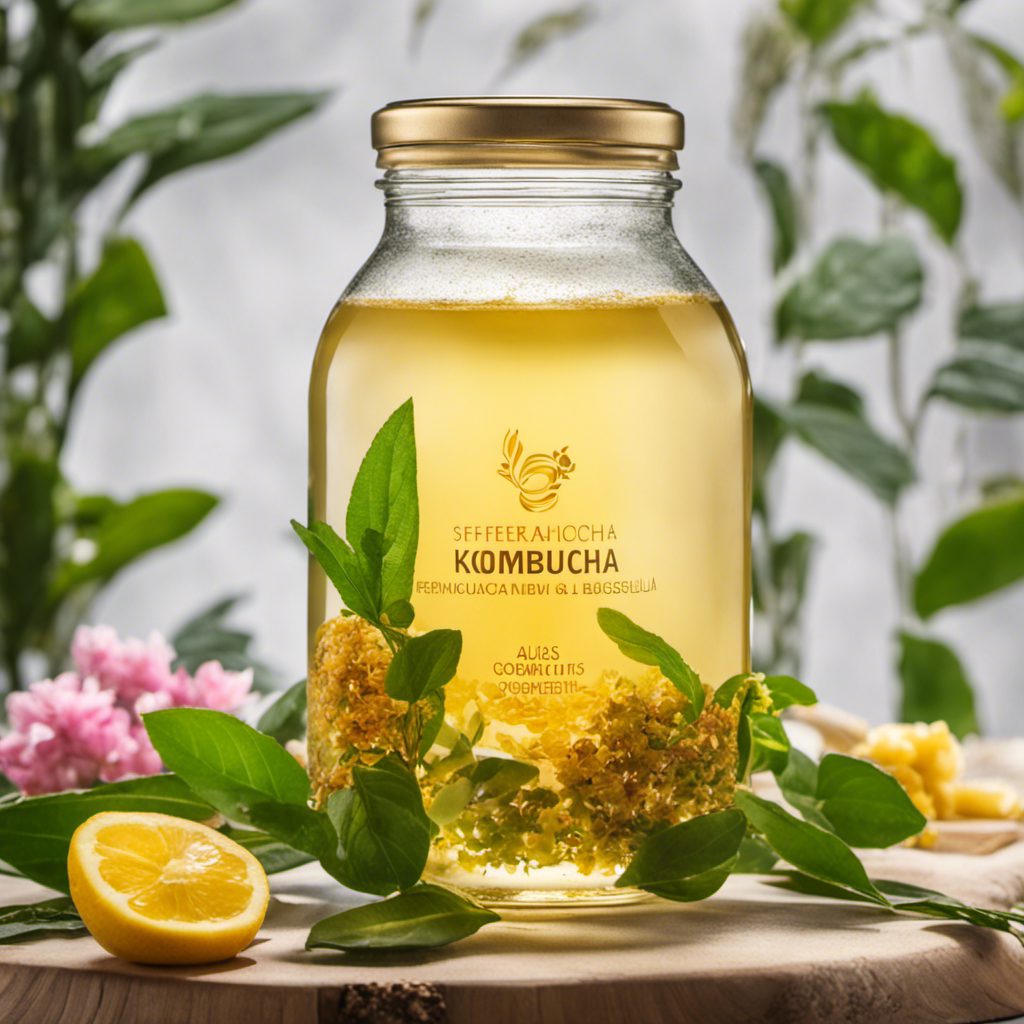
As someone who is constantly searching for natural remedies and superfoods to improve my overall health, I have come across a powerful ingredient that has piqued my interest: lactobacillus kombucha.
This fermented tea beverage is gaining popularity for its health benefits, especially in promoting gut health, digestion, and reducing inflammation.
Join me as we uncover the potential benefits of lactobacillus kombucha and learn how to unleash its power in our daily routines.
Key Takeaways
- Lactobacillus kombucha is beneficial for improving gut health, digestion, and reducing inflammation.
- It has the potential to prevent chronic diseases like heart disease and cancer.
- Caution should be exercised in homemade preparation to avoid contamination or over-fermentation.
- Incorporating lactobacillus kombucha into the daily routine can lead to experiencing its many potential benefits.
Health Benefits of Lactobacillus Kombucha
I believe that incorporating lactobacillus kombucha into my daily routine can lead to experiencing its many potential health benefits.
Lactobacillus kombucha is a type of probiotic-rich beverage that’s known for promoting gut health and improving digestion.
It has also been found to reduce inflammation in the body, which may have positive effects on overall health.
While more research is needed to fully understand the specific impact of lactobacillus kombucha, it’s important to note that there may be potential side effects.
It’s recommended to consume kombucha in moderation and follow the recommended daily dosage.
This will help ensure that you’re reaping the benefits of lactobacillus kombucha while minimizing any potential risks.
Importance of Research on Lactobacillus Kombucha
Researchers have conducted numerous studies to uncover the potential health benefits of Lactobacillus Kombucha, providing valuable insights into its impact on human well-being.
-
Benefits of lactobacillus kombucha in weight management: Studies suggest that the probiotics in kombucha may aid in weight loss and boost metabolism by improving gut health and digestion.
-
Potential role of lactobacillus kombucha in immune function: Research indicates that the probiotics in kombucha may enhance immune function and reduce inflammation, potentially leading to a strengthened immune system.
These findings highlight the importance of further research on lactobacillus kombucha to fully understand its potential benefits. Continued studies will help determine optimal use and specific impacts on different aspects of human health.
It’s crucial to exercise caution in homemade preparation to avoid contamination or over-fermentation. Additionally, incorporating lactobacillus kombucha into the daily routine can lead to experiencing its many potential benefits, including improved gut health, reduced inflammation, and possibly preventing chronic diseases.
Caution in Homemade Preparation of Lactobacillus Kombucha
One should exercise caution in homemade preparation of lactobacillus kombucha to ensure proper hygiene and minimize the risk of contamination or over-fermentation.
Contamination can occur due to improper handling or unsanitary equipment, leading to the growth of harmful bacteria. Over-fermentation can result in a sour taste and increased alcohol content, which may be undesirable.
To prevent contamination, it’s crucial to maintain cleanliness during the brewing process, including sterilizing utensils and containers. Following recommended guidelines for fermentation time and temperature is also important to avoid over-fermentation. Additionally, using quality ingredients and properly storing the kombucha can help maintain its safety and quality.
Similar Benefits to Green Tea Kombucha
I find it fascinating that incorporating green tea kombucha into my diet can provide additional health benefits similar to green tea. Green tea alternatives are gaining popularity, and kombucha brewing techniques offer a unique way to enjoy these benefits.
- Green tea kombucha is a probiotic-rich beverage that promotes gut health and improves digestion.
- Like green tea, it has anti-inflammatory properties that can reduce inflammation in the body.
- Studies suggest that consuming kombucha may help prevent chronic diseases like heart disease and cancer.
- Additionally, it aids in weight loss and boosts metabolism, making it a great addition to a healthy diet.
- Choosing high-quality green tea kombucha is important to ensure maximum benefits.
Incorporating green tea kombucha into your daily routine can provide a diverse range of beneficial microorganisms in the gut, similar to green tea. It’s a great alternative for those looking to enjoy the health benefits of green tea in a different form.
Incorporating Lactobacillus Kombucha Into the Daily Routine
The daily routine can be enhanced by incorporating lactobacillus kombucha, a probiotic-rich beverage with numerous potential health benefits. Lactobacillus kombucha has been linked to improved gut health, digestion, and reduced inflammation in the body. Additionally, it may have a positive impact on weight loss and metabolism.
Incorporating lactobacillus kombucha into the daily routine can potentially aid in weight management and promote a healthier immune system. To fully understand the impact of lactobacillus kombucha on weight loss and immune health, further research is needed.
It’s important to note that homemade preparation of kombucha should be done with caution to ensure cleanliness and avoid contamination. Overall, incorporating lactobacillus kombucha into the daily routine can contribute to a healthier lifestyle and potentially provide a range of health benefits.
Lactobacillus Kombucha and Gut Health
Research suggests that incorporating lactobacillus kombucha into my daily routine can improve gut health and promote overall well-being. This fermented tea contains beneficial bacteria that can have a positive impact on our immune system and weight management.
Here are some key points to consider:
- Lactobacillus kombucha helps strengthen the immune system by promoting a healthy balance of gut bacteria.
- The probiotics in lactobacillus kombucha can aid in weight management by improving digestion and metabolism.
- Regular consumption of lactobacillus kombucha may reduce inflammation in the body, which is linked to various chronic diseases.
- It’s important to note that homemade kombucha should be prepared with caution to avoid contamination or over-fermentation.
- When choosing lactobacillus kombucha, opt for high-quality options to ensure maximum benefits.
Incorporating lactobacillus kombucha into my daily routine can have a positive impact on my gut health, immune system, and weight management.
Lactobacillus Kombucha and Chronic Disease Prevention
Regular consumption of lactobacillus kombucha has shown potential in preventing chronic diseases such as heart disease and cancer. Studies have indicated that the probiotics present in lactobacillus kombucha can have a positive impact on the immune system, enhancing its ability to fight off infections and diseases.
Additionally, emerging research suggests a potential link between lactobacillus kombucha and mental health. The gut-brain axis, which connects the gut and the brain, is influenced by the gut microbiota. The probiotics in lactobacillus kombucha may help improve the balance of gut bacteria, thereby positively impacting mental health conditions such as anxiety and depression. However, more research is needed to fully understand the mechanisms behind these potential benefits.
Understanding Probiotic Content in Lactobacillus Kombucha
I’m fascinated by the potential benefits of lactobacillus kombucha and I’m eager to understand the variability of its probiotic content. Probiotics, such as lactobacillus strains, play a crucial role in maintaining a healthy gut and overall well-being. When it comes to kombucha, the fermentation process is responsible for the formation of these beneficial microorganisms.
Here are five key points to consider regarding the probiotic content in lactobacillus kombucha:
-
Probiotic Strains: The specific strains of lactobacillus present in kombucha can vary, which may impact their potential health benefits.
-
Fermentation Process: The duration and conditions of the fermentation process can influence the probiotic content in kombucha, leading to variations in the number and types of beneficial bacteria present.
-
Quality Control: Ensuring proper hygiene and following recommended guidelines during the brewing process are essential to maintain the quality and safety of the probiotic-rich kombucha.
-
Labeling Information: Checking the labeling information on commercially available kombucha products can provide insights into the specific probiotic strains present.
-
Scientific Research: Ongoing scientific research is crucial to fully understand the variability of probiotic content in lactobacillus kombucha and its potential impact on human health.
Maximizing the Potential Benefits of Lactobacillus Kombucha
To fully maximize the potential benefits of lactobacillus kombucha, I aim to incorporate it into my daily routine and consume it in adequate amounts. By doing so, I can promote gut health, improve digestion, reduce inflammation, and potentially prevent chronic diseases like heart disease and cancer.
It’s important to note that the fermentation process plays a crucial role in the efficacy of lactobacillus kombucha. Maximizing the fermentation process ensures a higher probiotic content and a more potent drink. However, it’s essential to exercise caution in homemade preparation to avoid contamination or over-fermentation.
While lactobacillus kombucha offers numerous benefits, it’s important to be aware of potential side effects such as bloating or allergic reactions. As with any dietary change, it’s recommended to consult with a healthcare professional before incorporating lactobacillus kombucha into your routine.
Considerations for Choosing High-Quality Lactobacillus Kombucha
When choosing high-quality lactobacillus kombucha, it’s important to consider both the probiotic content and the fermentation process.
-
Choosing reputable brands ensures a reliable source of lactobacillus kombucha.
-
Evaluating the fermentation process guarantees optimal probiotic growth and development.
-
Look for brands that use organic ingredients for a healthier product.
-
Check for transparency in labeling, including information about the specific strains of lactobacillus used.
-
Consider the packaging and storage methods to ensure the kombucha remains fresh and potent.
By considering these factors, one can make an informed decision when selecting lactobacillus kombucha.
It’s crucial to choose reputable brands and evaluate the fermentation process to ensure the highest quality and maximum health benefits.
Taking these steps will enable individuals to harness the power of lactobacillus kombucha and experience its potential advantages for gut health, digestion, and overall well-being.
Frequently Asked Questions
Can Lactobacillus Kombucha Be Harmful if Not Prepared Properly at Home?
If not prepared properly at home, lactobacillus kombucha can have harmful effects due to the fermentation process. It is important to exercise caution and follow recommended guidelines to avoid contamination and ensure safe consumption.
How Does Lactobacillus Kombucha Compare to Other Probiotic-Rich Foods and Beverages?
Lactobacillus kombucha offers unique health benefits when compared to other probiotic-rich foods and beverages. Its ability to improve gut health, digestion, and reduce inflammation sets it apart. Incorporating lactobacillus kombucha into your routine can unleash its potential benefits.
Are There Any Specific Guidelines for Storing and Fermenting Homemade Lactobacillus Kombucha?
Storing and fermenting homemade lactobacillus kombucha? Follow these best practices: maintain proper hygiene and cleanliness, avoid contamination and over-fermentation. Troubleshooting tips: adhere to recommended guidelines, ensure quality and safety through storage and fermentation.
Can Lactobacillus Kombucha Help With Weight Loss and Boosting Metabolism?
Yes, lactobacillus kombucha can potentially help with weight loss and boosting metabolism. Ongoing research suggests that the probiotics in kombucha may have a positive impact on weight management and metabolic function.
What Are the Potential Additional Health Benefits of Incorporating Green Tea Kombucha Into the Diet?
Incorporating green tea kombucha into my diet has the potential to provide additional health benefits. It can offer potential antioxidant benefits and have a positive impact on gut health, improving overall well-being.
Conclusion
In conclusion, unlocking the power of lactobacillus kombucha can truly be a game-changer for our health and well-being. By incorporating this fermented tea into our daily routines, we can experience the benefits of improved gut health, digestion, and reduced inflammation.
With ongoing research, we can continue to uncover its full potential and maximize its benefits. So, let’s raise a glass of lactobacillus kombucha and toast to a healthier and happier life! Cheers to the power of nature’s remedies!
In the vast and diverse world of coffee, coffee alternatives, and tea, Olivia has found her calling. As an author and a dedicated coffee and tea aficionado, her work for Cappuccino Oracle reflects her profound love and understanding of the intricate complexities found within these beverages. Olivia’s passion for the subject serves as both a catalyst for her creativity and a connection point with her audience.
Olivia’s appreciation for coffee, coffee alternatives, and tea blossomed at an early age. She discovered that these beverages invigorated her senses and stimulated her creative spirit. From the nuanced flavors of single-origin roasts to the captivating narratives intertwined with coffee, coffee alternatives, and tea trade and culture, Olivia found an unlimited source of inspiration in her daily cup.
Her love for these beverages and her talent for storytelling eventually converged at Cappuccino Oracle. As an author, Olivia’s mission is to illuminate the intricate tapestry that makes up the world of coffee, coffee alternatives, and tea. Her articles span a diverse range of topics, encompassing everything from the unique flavors of different brews to the sociocultural history intertwined with their cultivation and consumption.
-

 Americano4 weeks ago
Americano4 weeks agoHow to Make Americano With Moka Pot
-

 Americano2 weeks ago
Americano2 weeks agoHow to Make Korean Iced Americano
-

 Americano4 weeks ago
Americano4 weeks agoHow to Make Iced Americano With Instant Coffee
-

 Americano4 weeks ago
Americano4 weeks agoHow to Make Americano With Bialetti
-

 Americano4 weeks ago
Americano4 weeks agoHow to Make Dutch Bros Americano
-

 Americano6 days ago
Americano6 days agoHow to Make an Iced Americano With Nespresso
-

 Americano2 weeks ago
Americano2 weeks agoHow Many Shots of Espresso for 16 Oz Americano
-

 Americano4 weeks ago
Americano4 weeks agoHow to Make a Hazelnut Americano








